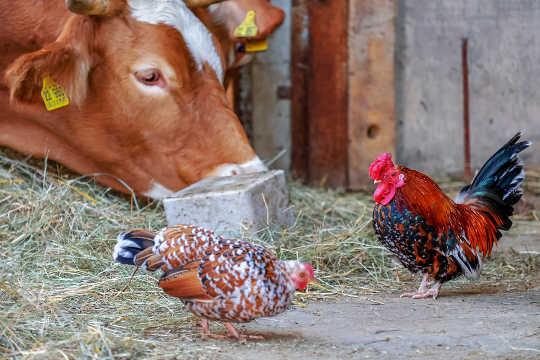"It would be great if more poultry and fish production and consumption would reduce that of beef, but that doesn't seem to be the case," says Richard York.
Eating poultry and fish to reduce the production of land-based meat is an environmentally friendly idea, but it’s not working, research indicates.
Sociologist Richard York of the University of Oregon recently conducted a new analysis of 53 years of international data. His findings appear in the journal Nature Sustainability.
“If you have increases in the production of poultry and fish, it doesn’t tend to compete with or suppress other meat source consumption,” he says. “It would be great if more poultry and fish production and consumption would reduce that of beef, but that doesn’t seem to be the case.”
Get The Latest By Email
In 2012, a study by York in the journal Nature Climate Change found that the same human behavior played out with new technologies offering renewable energy sources to potentially replace fossil fuel-based production; adding new sources doesn’t substantially suppress an existing, long-used source.
“They end up not in competition,” York says. “Adding more wind doesn’t really result in using less coal. If we use more energy sources, we use more energy. Likewise, when additional meat choices are offered, that additional variety tends to, more simply, increase overall meat consumption.”
The new study provides a baseline view of meat consumption during the years of rapid post-World War II industrialization. During this period, especially beginning in the 1960s and 1970s, poultry consumption rose fivefold per capita with a growing population, providing an alternative to beef, mutton, and lamb—land-grazing meat sources that require extensive energy to produce.
York also considered the twofold increase in the consumption and production of sea and freshwater fish, as well as aquatic non-fish foods such as crawfish, clams, mussels, and shellfish. Pork also rose twofold in the 1961-2013 study period.
The failure of alternative energy and meat sources to suppress original sources, York says, is known as a displacement paradox.
“Consumer demand does not make that big of a difference,” York says. “Some people reduce their driving to do their part to reduce the consumption of fossil fuel. That doesn’t mean that the oil industry is reducing production. If enough people drive less that makes the price of gas go down. That, in turn, means driving more becomes more desirable to others because fuel costs are lower.”
Agriculture, as of 2019, produced 10% of greenhouse gas emissions in the United States, with emissions rising 12% since 1990, according to the US Environmental Protection Agency. The dairy industry in 2017 produces 3.4% of US greenhouse emissions, according to the EPA.
From a policy perspective, York says, there needs to a concerted focus on the supply chains to assure that tradeoffs among meat alternatives are meaningful.
“Rather than simply increasing renewable energy production, we need to actively suppress fossil fuel production instead of just giving more options,” York says. “With meats, we may need to address the level of subsidies given for meat consumption to realize a desired reduction in meat production.”
books_food








